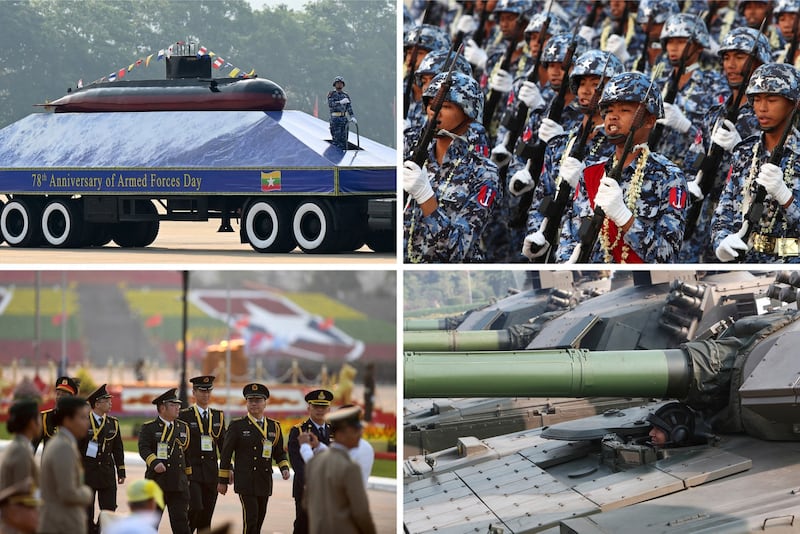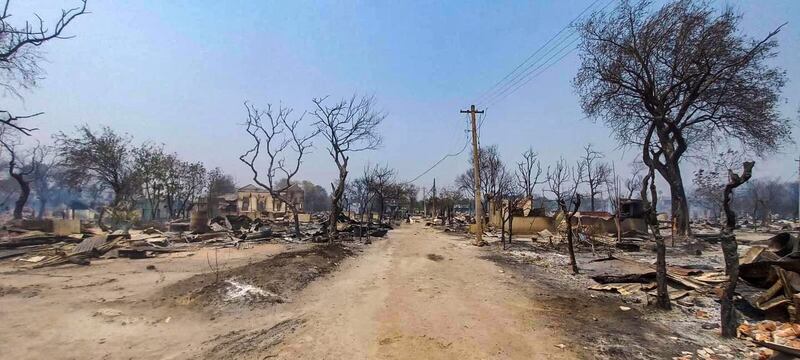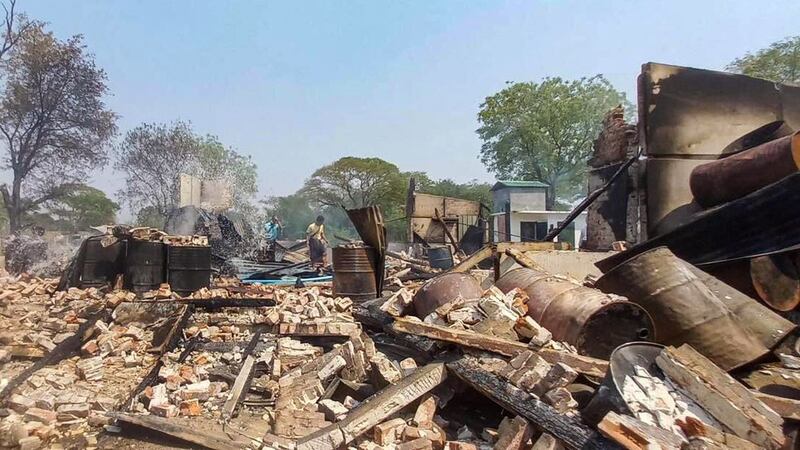Myanmar’s junta chief Min Aung Hlaing marked the 78th anniversary of the country’s Armed Forces Day on Monday with a vow to “take decisive action” against the military’s opposition, prompting derision from observers who dismissed what they said were empty threats.
Speaking at a ceremony in the capital Naypyidaw, Min Aung Hlaing called the shadow National Unity Government, anti-junta People’s Defense Force paramilitary groups, and armed ethnic organizations “terrorists” who seek to destroy the nation, vowing to eradicate them.
“The Tatmadaw is going to work to ensure the safety and security of the socio-economic lives of the people and to achieve full stability and rule of law throughout the nation,” he said, using the official name of the country’s military.
“In doing so, we are going to take decisive action against the NUG and terrorist organizations and the [ethnic armies] who are helping them.”
Min Aung Hlaing spoke at a massive parade ground flanked by the towering golden statues of three kings who founded Myanmar’s key dynasties. The ceremony was replete with a color guard on horseback, thousands of marching soldiers shouldering rifles with bayonets, tanks, and mobile missile launchers.
Amid the fanfare, it was difficult to tell that the parade ground had come under attack only a day earlier by the PDF, which hit the site with four 107mm rockets.
While the junta has yet to issue any statement about the rocket attack, security was notably tightened on Monday, with double the number of troops posted at Naypyidaw’s entrances and crowded marketplaces.
As the festivities were held, opposition groups protested military rule in several cities, including the commercial capital Yangon.

Nan Lin of the University Students’ Union Alumni Force in Yangon told RFA that the junta was using Armed Forces Day to display its strength to its opponents, but said his impression was much different than it was two years ago, just weeks after the military seized power in a Feb. 1 coup d’etat.
On Armed Forces Day in 2021, the junta violently suppressed and fired on protesters across the country, killing more than 100 civilians, according to data collected by Thailand’s Assistance Association for Political Prisoners (Burma).
“Their military demonstration two years ago was intended to show the international community how powerful they were and how much they were in control of the country,” he said.
“But this year, I see that the military parade on Tatmadaw Day is just a failing attempt to show the military and its sympathizers – as well as the people and the international community – that they still hold onto power.”
Following the coup, the military launched an ambitious offensive to subdue its opposition throughout the country. The offensive quickly devolved into a scorched earth campaign, with junta troops regularly looting villages, torching homes, and torturing and killing civilians.
But more than two years later, the military has made little headway, while the armed opposition has increasingly adapted and made significant gains, despite being outmatched in equipment, training, and manpower.
Empty threats
Ethnic armed groups and PDF groups shrugged off Min Aung Hlaing’s threats on Monday, telling RFA that there is little the military can do that it hasn’t already tried.
Khu Hteh Bu, the spokesperson of the Karenni National Progressive Party (KNPP), the political wing of the Karenni Army, said the military has been arresting and torturing Myanmar’s ethnic minorities “for decades” with no result.
“We think that the more threateningly they talk to us, the more they reveal the pain and loss they have suffered because of us,” he said.
“They are using all their strength to crush us. But since the people neither support them nor give up rebelling against them, they are just creating their own sordid destiny.”
Former Major Cpt. Ngwe Soe, who defected from the military and is now the spokesman for the Naypyidaw PDF, called Min Aung Hlaing’s threats hollow.
“This is just his foolish stance to never back down until his last breath, but it will never be possible to crush us like he said,” Ngwe Soe said. “The revolutionary forces – such as the NUG, the PDF and the [ethnic armies] have made significant progress in the two years since the military coup.”
National Unity Government Ministers’ Office spokesman Nay Phone Latt said the military is already throwing everything it has at the armed resistance, with little to show for it.
“The NUG, the PDFs and the ethnic forces are well prepared for their attacks,” he said.
Seven elderly villagers killed
Armed Forces Day came as at least seven elderly residents burned to death in fires set by junta troops during a raid on Sone Kone village in Sagaing region’s Budalin township over the weekend.
A resident of Sone Kone told RFA that a military column of more than 50 troops descended on the village at around 8 a.m. on Saturday and began setting structures alight, trapping the six elderly women and one elderly man inside.
“Their family members left them at home as they were too old to run or move quickly,” said the resident who, like other sources interviewed for this story, spoke on condition of anonymity citing fear of reprisal.
“Since the elderly people who were left in their homes during previous raids were spared, the younger villagers just ran for their lives, leaving the victims behind in their homes, thinking that [the soldiers] would not harm the elderly. When the burnings began, there was nothing they could do to save them.”

The women killed in the fires were Tin Ei, 80; Daw Pyae, 81; Than Myint, 58; Kyi Aung, 70; Daw Khway, 84; and Khin Myint, 84. Kyee Myint, a 70-year-old man, also perished in the flames.
The resident said that by the time the troops left three hours later, some 175 of Sone Kone’s 300 homes had been razed.
A second resident of Sone Kone told RFA that his home and all of his belongings were destroyed in the arson.
“Since many other villagers’ houses were also burned down, we are facing a lot of difficulties here, including a lack of food and shelter,” he said.
Those whose houses were burned are now taking shelter in nearby villages, residents said.
Possible revenge attack
The Budalin Township Information Team told RFA that Saturday’s attack came a day after anti-junta People’s Defense Force paramilitaries ambushed junta troops with a landmine in the vicinity of Sone Kone, leaving several soldiers injured. The timing of the two incidents suggest that the military raided Sone Kone as revenge for the ambush.
A member of the Budalin PDF said his group attacks junta troops “in every possible situation” in a bid to prevent village raids, but that sometimes conditions do not allow for them to face the military head on.
“There are some villages such as [Sone Kone] that we are not in position to protect and the people there suffered,” he said. “If our captain tells us that we cannot defend a certain place, we have to follow orders. We have to avoid [direct] contact with the military [to avoid heavy casualties].”

The junta had yet to issue an announcement about the incident at Sone Kone as of the time of publishing. Calls by RFA to Aye Hlaing, the junta’s social affairs minister and spokesman for Sagaing region, went unanswered Monday.
Around 200 junta troops in two columns are currently carrying out “clearing operations” of the eastern and southern villages of Budalin township, residents said.
Data for Myanmar, which compiles data on the military’s use of arson, said that between the coup and the end of February, junta troops had burned a total of 60,459 civilian homes across the country. Of these, 47,778 were located in Sagaing.
According to the Assistance Association for Political Prisoners (Burma), junta troops have killed at least 3,166 civilians and arrested nearly 21,000 others since the coup, mostly during peaceful anti-junta protests.
Translated by Myo Min Aung. Edited by Joshua Lipes and Matt Reed.
